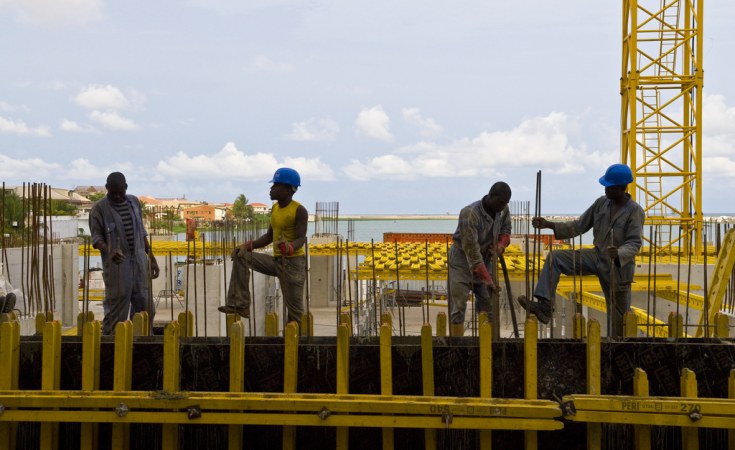Gulf states' riches have been built on oil, credit and exploited migrant labour. Increasingly, these workers are African.
The imported proletariat of the Gulf states - the construction workers, domestic workers, nannies, waiters, bellboys, receptionists, cleaners - face countless daily hazards. They endure low wages, cramped bunks, scant legal rights, passport confiscation, debt, physical abuse and deportation at a moment's notice, to name a few.
This time last year, a fire swept through a work camp in Bahrain, killing 13 Bangladeshi workers. Two or three such fires occur each year.
In 2011, an Indian migrant worker jumped from the Burj Khalifa in Dubai, reportedly after being refused leave, falling 40 floors to his death. In 2012, an Ethiopian maid attempted suicide in Dubai after she had been denied her salary for three months - she was arrested and fined.
For every shining skyscraper, every oil sheikh's villa, every five star pool paradise, there is misery, danger and depression for millions of migrants.
It is well-known that in the Gulf, infringements of political rights, freedom of speech and gender equality are serious problems, but it is the treatment of migrant workers that is the greatest scandal of all. And these migrant workers are increasingly coming from Africa.
Crossing the Red Sea
Across the Gulf Co-operation Council states - made up of Bahrain, Qatar, Oman, the United Arab Emirates (UAE), Saudi Arabia and Kuwait - there are estimated to be over 17 million migrants, making up over 40% of the bloc's total population. In the UAE and Qatar, more than 80% of the population are foreigners.
Many of these foreign workers arrived in the Gulf from the likes of India, Sri Lanka, Bangladesh and the Philippines after the oil boom lifted the region's economy.
Most of these employees endure difficult circumstances in the hope they can send remittances home to support their families.
However, increasingly, workers from African states are now making the trip to the Gulf too. With fewer people from India choosing to cross over to the Gulf as living standards improve in their own homelands, migrants from the likes of Sudan, South Sudan, Uganda, Kenya, Somalia and Ethiopia are filling the gap.
Mapping the exact scale of African migration to the Gulf is very difficult, especially given the often unregulated and informal methods through which it occurs, but the UN's Refugee Agency has estimated that over 100,000 Africans made the journey from the Horn of Africa to Yemen - a main transit point on the way to other Gulf states - in 2012 alone.
African migrants occupy similar positions to their South Asian counterparts and predecessors and do many of the same jobs, including in the security forces.
In January, Sudanese newspaper Al Mashhad advertised 5,000 new positions within the Bahraini police force and army, and according to Walaa Salah Mohamed Abdelrhman, a human rights activist in Sudan, the news piece was backed up by teams scouring both Khartoum and eastern Sudan looking for recruits.
Salah claims particular attention is being paid to the Rashaida people and that those signed up are sent to Bahraini training camps for six months, after which they are admitted to the army and offered Bahraini citizenship.
A source in Bahrain who wished to remain anonymous also reported that there has been a notable increase in the number of African, possibly Sudanese, riot police.
Disposable workers
Evidence suggests that the treatment received by African migrants has not been any better than that experienced by their South Asian counterparts.
In 2011, a gut-wrenching note from a young Kenyan woman to her mother back home was published in a local newspaper:
"Mom, yesterday my boss asked me if I want to be sold or not. I fear he might kill me. If it is God's plan that I die in Saudi Arabia, there is nothing I can do. Bye mom." That was the last the family of the 22-year old Kenyan heard from her.
Another letter from another worker read: "I am always locked in; eat smelly food or leftovers, one meal a day, I am a Kenyan, please help me get out of here, alert my embassy. You are my last hope." When contacted by the newspaper that published the letter, her employer claimed to be unaware of the situation.
"These workers are ripe for exploitation," explains Rima Kalush, editor of Migrant Rights, before identifying Ethiopians - who make up a large proportion of migrants in the Gulf, especially Saudi Arabia and UAE - as being particularly vulnerable.
"Broadly speaking, Ethiopians are lower paid and favoured less than workers from other countries," she says. "Their governments are often in a lower position to bargain for improved conditions. Several countries don't have any representation in the region at all."
Indeed, in November 2013, in a move that highlighted their precarious position in the Gulf, Saudi Arabia - in a bid to reduce its dependency on foreign workers and address unemployment - started deporting undocumented Ethiopians.
To date, some estimate that as many as 150,000 have been sent back to Ethiopia empty-handed and left in limbo. Several were reportedly killed in violent raids by immigration police, and there were claims that Saudi vigilantes attacked Ethiopian migrants in the wake of the government's announcement.
On the one hand, many in East Africa may be pleased at the opportunity for a new life and employment across the Red Sea. But on the other, the life that awaits many is one of hardship, low pay and scant rights.
Nowhere is the status of Africans migrants more tragically and clearly expressed than in the fact that while Gulf states' may be happy to employ them as their new proletariat, they can just as happily get rid of them at a moment's notice.


